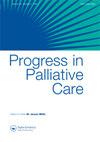员工利益相关者对英国护理人员在病人生命的最后一年提前护理计划中的作用的看法
IF 0.8
Q4 PUBLIC, ENVIRONMENTAL & OCCUPATIONAL HEALTH
引用次数: 5
摘要
背景早期提前护理计划对即将结束生命的患者有明显的好处,但许多由英国护理人员护理的患者并没有这样的计划。目的探讨员工利益相关者对英国护理人员在预先护理规划中的作用的看法,包括使用黄金标准框架主动识别指南对患者进行筛查和转诊。方法对英格兰西南部的护理人员、全科医生、急诊科和社区医生和护士进行半结构化电话访谈。结果17名工作人员利益攸关方参加了会议。确定了四个主要主题:缺乏预先护理规划;健康状况的差异;缺乏联合护理;质量差的临终谈话。医护人员使用黄金标准框架主动识别指南来筛查和转诊患者以进行预先护理计划被认为是可行和可接受的,其好处包括识别无法获得初级护理的患者,并有可能减少可避免的住院人数。结论英国护理人员能够很好地筛查和推荐患者进行预先护理计划。需要进一步的研究来探索如何发展这种类型的干预措施,以适应以社区为中心的方法,旨在改进预先护理规划。本文章由计算机程序翻译,如有差异,请以英文原文为准。
Staff stakeholder views on the role of UK paramedics in advance care planning for patients in their last year of life
Background Early advance care planningh as clear benefits for patients approaching the end of their life, yet many of those attended by UK paramedics do not have this planning in place. Aims To explore staff stakeholder views on the role of UK paramedics in advance care planning, including the use of the Gold Standards Framework Proactive Identification Guidance for screening and referral of patients. Methods In-depth semi-structured telephone interviews with paramedics, general practitioners, Emergency Department and community doctors and nurses in the South West of England. Results Seventeen staff stakeholders participated. Four main themes were identified: a lack of advance care planning; variation across health conditions; a lack of joined-up care; poor-quality end of life conversations. Paramedic use of the Gold Standards Framework Proactive Identification Guidance to screen and refer patients for advance care planning was seen as feasible and acceptable, with perceived benefitssuch as identifying patients not accessing primary care, and the potential to reduce avoidable hospital admissions. Conclusions UK paramedics are well-placed toscreen and refer patients for advance care planning. Further research is needed to explore how this type of intervention might be developed to fit into a community-centred approach aimed at improving advance care planning.
求助全文
通过发布文献求助,成功后即可免费获取论文全文。
去求助
来源期刊

PROGRESS IN PALLIATIVE CARE
PUBLIC, ENVIRONMENTAL & OCCUPATIONAL HEALTH-
CiteScore
2.60
自引率
11.80%
发文量
24
期刊介绍:
Progress in Palliative Care is a peer reviewed, multidisciplinary journal with an international perspective. It provides a central point of reference for all members of the palliative care community: medical consultants, nurses, hospital support teams, home care teams, hospice directors and administrators, pain centre staff, social workers, chaplains, counsellors, information staff, paramedical staff and self-help groups. The emphasis of the journal is on the rapid exchange of information amongst those working in palliative care. Progress in Palliative Care embraces all aspects of the management of the problems of end-stage disease.
 求助内容:
求助内容: 应助结果提醒方式:
应助结果提醒方式:


